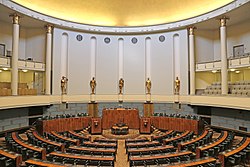College of Representative of Livana (Pacifica)
College of Representative Collegium Legatorum | |
|---|---|
| 2023–2025 | |
 | |
| Type | |
| Type | of the Parliament of Livana |
Term limits | 2 |
| Leadership | |
Tarnius Josiah (Independent) since 2 January 2020 | |
Deputy Speaker | |
| Structure | |
| Seats | 128 |
 | |
Political groups | Forward Coalition Opposition |
| Authority | Passing laws and budgets; oversight on the executive branch |
| Elections | |
| Party-list proportional representation | |
Last election | 2 June 2023 |
Next election | 1 January 2025 |
| Meeting place | |
 | |
| Parliament Hall Livonia, Livana | |
The College of Representative (Livanan: Collegium Legatorum), also known as the House of Representatives, is the lower house of the national legislature of Livana, the Parliament of Livana. It exists together with the upper house, the College of Seers. Members of the College of Representatives, referred to as Consulum (MPs), are elected through elections held every five years. Currently, there are 128 members of the College, consisting of 5 political parties that formed two major coalitions; the Forward Coalition which is the current government coalition, and the opposition coalition People's Coalition.
Powers and Responsibilities
In a Parliamentary Democracy, the Parliament is the main organ of governance, from which the executive branch of the government is formed. The College of Representatives however is the dominant half of the Parliament, as the College of Seers only held advisory functions. The Prime Minister is elected by the College of Representatives, and in extension, his/her cabinet will be formed from members of the College of Representatives. The College's powers can be categorized into three main functions: the function of legislative, the function of budgeting, and the function of oversight. To achieve this functions, the College of Representatives has been given several prerogatives, including:
- Right to propose, draft, and calling for deliberations over bill of laws.
- Right to receive advisory inputs from the College of Seers regarding certain topics relating to deliberated bill of laws.
- Right to vote on and pass bill of laws to the President for official assent and legitimize its use.
- Right to overrule the use of veto power by the President through a 2/3 majority approval by the members.
- Access to government budget plans and right to vote on government budget to legitimize its use.
- Access to official inventory reports made by the treasury.
- Receiving accountability reports from members of the government in regard of the use of the approved budget, and the right to accept/reject the accountability reports.
- Overseeing the execution of laws, the government budget, and government policies.
- Right to vote of confidence on the government's accountability and legitimacy.
Structure
Leadership
The leadership of the College of Representatives consisted of a Collegiate Speaker, and a Deputy Speaker. The Collegiate Speaker is elected by MPs with a simple majority vote. The Collegiate Speaker then appointed a Deputy Speaker with reference to 'diversity of political alignment', and usually appoints the Deputy Speaker from both the opposition coalitions. The current Collegiate Speaker is Tarnius Josiah, elected back in 2020, formerly a Workers and Labours member, but after the Parliamentary Crisis of 2023, declared himself to be an independent in conjuncture with his caretaker government during the duration from the motion of no-confidence in April 2023 and the election of the Forward Coalition in June. His Deputy Speaker is Jonathan Parker, a Liberal MP.
Commissions
The memberships of the College of Representatives is further divided into commissions, each comprised of 32 MPs. Commissions are where most legislative bills originated, where its content is drafted, debated, and then approved for voting in the main chamber. Although there are no legal prescription of the formation of the commissions, MPs usually agree to gave major parties dominant position in each of the four commissions by tradition since 1980. The four commissions are:
- First Commission: defense, foreign affairs, information and communication, as well as intelligence.
- Chair: Rubeus Nestor (Conservative MP)
- Second Commission: home affairs, law and order, and human rights affairs.
- Chair: Morey Gaston (Liberal MP)
- Third Commission: education, health, labour welfare, and government services.
- Chair: John Kemper (Syndicalist MP)
- Fourth Commission: economic and financial affairs, public works, industry, energy, and agriculture.
- Chair: Vera Staunton (Workers and Labours MP)
Current Composition

There are currently 5 political parties holding seats in the College of Seers. The current majority, the Forward Coalition, is formed after the snap election of 2023 in June, comprising 66 seats, 36 of which belong to the Liberal Party. Although the Workers and Labours Party became the largest party in the College, as it has been for the past eight years since the 2015 election, it failed to form a majority coalition and thus was deposed from the government in 2023. Speaker Tarnius Josiah is the only independent member of the College.
Coalitions is formed through agreements between parties within the College. Political parties are not mandated by law, and in theory everyone can run to become and MP, without the need of party affiliation. However, there were only a handful of independents in the entire history of the College. In 1990, independents held more than 10 seats within the college, a breakaway MPs from the Liberal Party as part of the protest in the opening of Aften Island for exploitation. These 10 independents soon would form the current Green Party. It is the only instance where independents held more than 1 or 2 seats until 2022 when the Green Party broke away from the People's Coalition and remained that way until April 2023.
| Coalition | Political Party | Seats | Coalition Leader | Seats per Coalition |
|---|---|---|---|---|
| Forward Coalition | Liberal Party | 36 | Dwight Raleigh | 66 |
| Conservative Party | 20 | |||
| Green Party | 10 | |||
| People's Coalition | Workers and Labours Party | 45 | Vera Staunton | 61 |
| Syndicalist Party | 16 | |||
| Independent | 1 | Tarnius Josiah | 1 | |
| Total | 128 | |||
Place of Meeting

The College of Representatives meets inside the Parliament Hall Building, usually referred to as the 'Hall', located in Citadel District, Livonia, it was constructed in 1981 and was finished in 1983 following the fall of Tarsis Vitruvia's Regime in January 1980, led by the architect Moribund Cassius in a neo-classical style. The building has five floors, each of which is unique. The floors are connected by a white marble staircase and an elevator, added in 2001 as accessibility feature. Most important for visitors are the main lobby, the stately plenary chamber (Session Hall) and the large reception hall (State Hall). Notable later additions to the building are the library annex completed in 2008 and a separate office block, to house the workspace of each MPs behind the main Parliament Hall.
The first floor of the Hall comprised of office spaces for the Speaker and the Deputy Speaker and small meeting hall for the commissions to meet, as well as quarters for the staffers of the Hall. The second floor is where the main plenary chamber is located, where voting is held, as well as addresses and speeches made by important figures of the Hall and the government. The third floor is mainly used by the Minutes Office which run notary and archival functions of the Hall, as well as a waiting room for the press and the Press Gallery, where conferences with the media can be held. The fourth floor comprised of the Seer Chamber, a meeting room of the College of Seers, as well as office quarters for Seers and their staffs. Amenities such as cafeteria, lounge rooms, and larger conference rooms are located in the fifth floor.